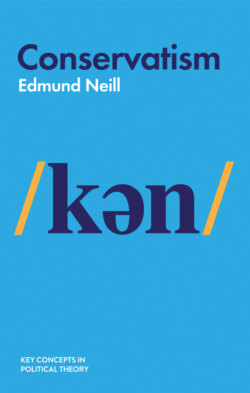Читать книгу Conservatism - Edmund Neill - Страница 7
The Challenge of Defining Conservatism
ОглавлениеIn fact, however, as soon as one considers the concept of conservatism more closely, it throws up difficult definitional and conceptual challenges. For although some thinkers usually described as ‘conservatives’ have upheld the four commitments just described, others have not necessarily advocated all of them, or even, in some cases, any of them (Eatwell and O’Sullivan 1989: 47–61). First, although conservatives have often argued that traditional forms of authority are important, even those that have done so have not necessarily denied the importance of the state. Thus, Roger Scruton in The Meaning of Conservatism (1980), to take one modern example, was quite happy to stress the importance of governmental authority and the rule of law, as well as highlighting the vital role of traditional institutions like the family in ensuring social solidarity (Scruton 2001: 39–41). Still less, in any case, have conservatives agreed on which institutions play the most vital role in providing authority. To some in the nineteenth century, such as the influential French theorist Joseph de Maistre, the religious authority of the church was vital; for others in the same century, such as the English conservative W. H. Mallock, let alone in the twentieth, it was largely irrelevant (Maistre 1820: 213; Ford 1974: 319).
Second, although it is true that conservatives have often been cautious about initiating far-reaching changes, there have certainly been instances where they have sought to change society fairly radically. Thus Margaret Thatcher and Ronald Reagan’s conservative administrations in the 1980s in Britain and the United States initiated major changes that fundamentally altered the relationship of individual, state and society, including significant reductions in direct taxation, the privatization of many government-owned industries, a reduction in the power of trade unions and an increase in home ownership (Hoover and Plant 2015). Third, although many conservatives have indeed generally rejected more substantive forms of equality, on the basis that such ‘levelling’ is neither natural nor desirable, they have nevertheless differed significantly between themselves over the degree to which they reject equality and accept traditional social hierarchies. Thus, even in the nineteenth century, various American conservatives, however much they rejected any notion of ‘social justice’, nevertheless took the idea of formal political equality guaranteed by the US constitution as sacrosanct; by contrast, some more radical conservative thinkers, such as Heinrich von Treitschke in Germany, argued much more explicitly against equal political participation on the basis that this contradicted man’s natural inequality (Sumner 1963; Dorpalen 1957).
Finally, although conservatives have often been supportive of both private property and modern capitalism as guarantees of freedom, there have also been important exceptions and qualifications. Edmund Burke, arguably one of the earliest British conservatives, thought that the success of the free market relied on existing social norms, rather than the other way round, and this suspicion of the market persisted amongst certain kinds of British conservatives well into the twentieth century – the renowned poet and conservative cultural critic T. S. Eliot being one such example. Furthermore, some conservatives – like Scruton, for example – have stressed that private property rights should not be immune from all interference by the state if the general material welfare of the population at large is endangered (Burke 1968: 140, 146; Eliot 1939; Scruton 2001: 97–9).
